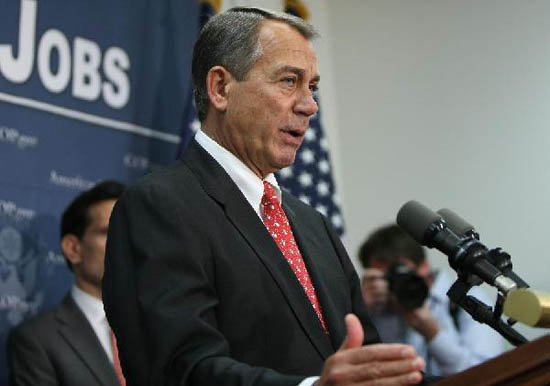
 |
| U.S. House Speaker John Boehner answers questions during a press conference on Capitol Hill in Washington D.C., the United States on Dec.18, 2012. Boehner said on Tuesday that he will move to a backup option for the fiscal woes due in January while remained hopeful a broader deal can be reached with the President Barack Obama. (Xinhua/Fang Zhe) |
WASHINGTON, Dec. 18 (Xinhua)-- U.S. House Speaker John Boehner said on Tuesday that he will move to a backup option for the fiscal woes due in January while remained hopeful a broader deal can be reached with the President Barack Obama.
Boehner spoke with reporters after a meeting with the Republican caucus to garner support for his recent offer for higher tax rates for households making over 1 million dollars a year.
"Our hope continues to be to reach an agreement with the President on a balanced approach that averts the fiscal cliff. What we've offered meets the definition of balance, but the President is not there yet," Boehner said.
Boehner said the backup plan would extend low income tax rates for households with incomes below 1 million dollars a year.
"I continue to have hope that we can reach a broader agreement with the White House that would reduce spending as well as have revenues on the table. I think it would be better for our country, " he noted.
Obama made a new fiscal offer Monday which lowered his demand on tax revenues increase further to 1.2 trillion dollars and called on lifting the debt limit for two years.
The latest proposal the White House offered was essentially 1.3 trillion dollars in new tax revenue and 850 billion dollars in net spending cuts, Boehner said. "That's not balanced in my opinion," he added.
As a step to break the budget impasse, Boehner offered Obama a plan last week, which includes letting tax rates rise for those who make over 1 million U.S. dollars a year, contingent upon entitlement spending cuts. The proposal calls for 1 trillion dollars in new tax revenue, more than the 800 billion dollars fresh tax revenue he initially offered.
Although differences remain, progress has been made in recent days as both sides made concessions on their long-held positions.
Without a deal from the Congress, all of the Bush-era tax rates will expire at the end of the year, and automatic spending cuts are set to be triggered. Economists have warned that the combination of tax hikes and spending cuts could tip the U.S. economy into recession.
















![]()
